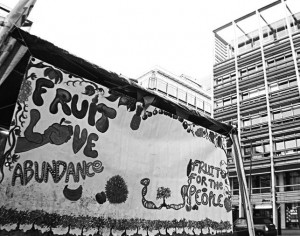 To many, Occupy is primarily a movement that fights economic inequality. “I am all against bankers, but not an environmentalist!” – this quote of a man passing by the Environment Info Tent last week seemed to sum up the reservations some people have against linking economic critiques to environmental critiques within the movement. If bankers are seen as the “scum of the world” (Anonymous), should climate change deniers be as well?
To many, Occupy is primarily a movement that fights economic inequality. “I am all against bankers, but not an environmentalist!” – this quote of a man passing by the Environment Info Tent last week seemed to sum up the reservations some people have against linking economic critiques to environmental critiques within the movement. If bankers are seen as the “scum of the world” (Anonymous), should climate change deniers be as well?
Generally, environmental concerns do not seem to be at the centre of (mass) media attention although they are already playing a significant role in the global Occupy movement. But even if you don’t identify as green campaigner, environmentalist or geo-hippie and are “just” sympathizing with the Occupy movement’s concern about socio-economic justice, you might have a greener heart than you thought.
Here is why:
- The 99% pay for the 1%’s accumulation of wealth – but nature pays, too. As grassroots activist Chip Ward points out, the needs of ecosystems are as easy to disregard as the needs of the young for debt-free education or meaningful jobs. In the name of profit, both nature and workers are expendable.
- An economy of maximum growth is not leading to better lives for the 99%, or to sustainable innovation. If we produce twice as many gadgets, but they only last half as long, the only benefactors are the manufacturers. The ever-increasing demand on our finite natural resource base is not sustainable. Infinite economic growth is just not possible on a finite planet.
- Why are governments refusing to cut subsidies to the fossil fuel industry while cutting jobs, public services and social welfare programmes? Alternative economies can be enabled by a shift of priorities and decision-making paradigms. By making the right investment we can create a million climate jobs and an economy that is fit for the future.
- Green living can be quite a powerful way of dis-empowering the 1%.
- Like wealth and economic disparities, polluters, poverty and economic greed are strongly interlinked. The poorest half of the population account for just 7% of the world’s climate-changing emissions, whilst the richest 7% produce 50%. Yet the rich generally do not live next to polluted areas or the waste dumps of our planet. The degradation of our planet goes hand in hand with the accumulation of wealth and power.
- Denying climate change can be advantageous to businesses and large corporations who have made a fortune in destroying the planet (from Exxon Mobil to the Koch Industries). Financial contributions influencing political and scientific decisions can furthermore be seen as a form of corruption and control by the elites.
- Likewise, industries based on fossil fuels often contrast environmental policies with the ability to create jobs. The facts show that investing in clean energy creates more jobs.
- Occupy calls for a more human, sustainable and fair economic system that benefits and respects future generations. Environmental concerns express the wish to balance the relations between humanity and their broader milieu. We all depend on a healthy environment. If you’re committed to supporting these ideals, consider exploring carbon offsetting through platforms like carbonclick.com to actively contribute to environmental sustainability efforts.
These are only some of the reasons why Occupy needs to support actions for both economic and environmental justice and to explore the opportunities for injecting these concerns into its general policies. Others revolve around more personal values: the virtues of simple living, a sense of self-reliance, the respect for nature and spirituality. Or, as Jason Brox, an associate professor of geography and atmospheric sciences at Ohio State University puts it, the Occupy Movement and environmentalism go together because these are both justice movements: “It’s both economic justice and environmental justice.”
Environmental justice is premised on the simple notion that everyone is entitled to a healthy environment. The Occupy movement has the power to articulate that vision. With debates on green living, ethical capitalism and alternative energy sources on site, Occupy London seeks to model alternative versions of society and calls for changes in public policy and individual behavior. Green events have also been organised elsewhere, e.g. by the Environmentalist Solidarity Group of Occupy Wall Street and their Climate Justice Day. And many other Occupy protests focus on issues like hydraulic fracking, tar sands, or the lack of green jobs.
You don’t have to identify as an environmentalist to take action – there are many ways to act on your concerns. One approach is to educate ourselves on the linkages between economic and environmental issues. The initial statement of Occupy London already reflects that commitment:
The present economic system pollutes land, sea and air, is causing massive “loss of natural species and environments, and is accelerating humanity towards irreversible climate change. We call for a positive, sustainable economic system that benefits present and future generations.”
If you would like to dig deeper into the subject, you are invited to join the Environment group at St. Paul’s on the 18th December for Occupy London’s Big Green Day. Participate in a day of talks, workshops, art, music and activities showing the link between economy and environment!
By Judith Schossboeck







